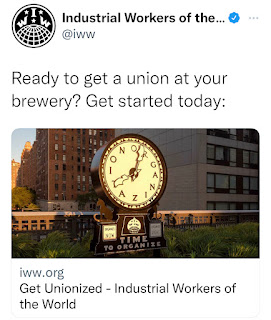Monday, April 11, 2022
Why I’m anti-union
“Jon, why are you anti-union?”
I’ve received this question a lot lately. Between all of my posts about the need for all employers (including craft breweries) to pay attention to the recent wave of union organizing, and my philosophy of workplace management that focuses on positive culture and positive treatment of workers, many have asked why I oppose labor unions.
Let me explain.
1/ Unions promote and protect the lowest common denominator
Collective bargaining agreements prohibit employers from firing a bargaining unit member without “just cause.” This severely hampers an employer's ability to control performance. Indeed, ask any unionized employees about their biggest headache and I guarantee most will tell you all about carrying the weight of their low-performing coworkers. Ask any employer and they will tell you the same, albeit from the other side of the ledger. The grievance and arbitration process also required by collective bargaining agreements makes discipline and terminations nearly impossible. I’ve seen too many arbitrators dispense “industrial justice” to return an undeserving employee to the job.
2/ Unions promote and protect the collective over the needs of the individual
With a union, employees lose the ability to communicate about work issues with management. They instead need to address them via collective bargaining or through the aforementioned formal grievance and arbitration process (all of which takes a lot of time. Employees also lose the ability to negotiate individually and instead must present everything collectively through their union. The individual needs and concerns of employees are subjugated to the collective good, no matter the merit.
3/ Unions prioritize longevity over merit
Collective bargaining agreements manage issues such as promotions and raises via seniority. It removes merit from the equation. Thus, employees are valued based on how long they’ve been with an organization, not by their contribution to it.
4/ Unions replace one business with another
A union is a business, just like an employer. Employees are funding a business that may, or may not, result in a net gain to them, and that they may or may not want or support. It’s a majority rules system, and long as 50% + 1 vote yes, all employees get the union.
5/ Unions create an "us versus them" attitude between workers and the company
“We” working together to create the best workplace possible becomes “us” versus “you.” The workplace can’t be at its best when employee relations is a contact sport.
6/ Nothing in the employer-employee relationship is supposed to be equal
In a business, ownership takes all of the risk. It’s their money, their collateral, their credit, and their reputation that’s on the line. That’s why it never is an equal bargaining relationship, nor should it be.
For more information, contact Jon at (440) 695-8044 or JHyman@Wickenslaw.com.
Do you like what you read? Receive updates two different ways:
Subscribe to the feed or register for free email updates.

